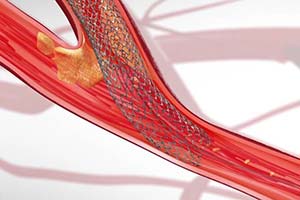Procedure Reduces the Risk of Stroke During Surgery
Nov 8, 2019 Vascular surgeons practicing at Baptist Health System use special technology to reduce the risk of stroke during surgery for patients undergoing a procedure to remove plaque from carotid arteries. The Transcarotid Artery Revascularization procedure or TCAR, offers patients a potentially safer method of carotid stenting. The carotid arteries supply oxygenated blood to the brain. In the TCAR procedure, a stent is inserted into the common carotid artery through a small incision. Stroke risk is reduced by temporarily reversing blood flow direction in the carotid artery, so that any debris dislodged by the procedure will not travel to the brain where it could cause stroke.
Vascular surgeons practicing at Baptist Health System use special technology to reduce the risk of stroke during surgery for patients undergoing a procedure to remove plaque from carotid arteries. The Transcarotid Artery Revascularization procedure or TCAR, offers patients a potentially safer method of carotid stenting. The carotid arteries supply oxygenated blood to the brain. In the TCAR procedure, a stent is inserted into the common carotid artery through a small incision. Stroke risk is reduced by temporarily reversing blood flow direction in the carotid artery, so that any debris dislodged by the procedure will not travel to the brain where it could cause stroke.
Every year, more than 300,000 people in the United States are diagnosed with blockages, or plaques, in their carotid artery. When these arteries become blocked due to plaque build-up, an individual is at high risk for a stroke if the plaque ruptures and flows to the brain. Many people can manage carotid artery disease with medications and lifestyle changes. However, others may require carotid artery revascularization surgery to repair the blockage in the artery.
This was the case for 78-year-old Jan Myers. He went to Northeast Baptist Hospital when he began suffering stroke symptoms. Vascular surgeon Grady Alsabrook, MD performed the TCAR surgery to open Myers’ carotid arteries. “I feel great now, and don’t have to look over my shoulder to see if the Grim Reaper is behind me,” says Myers.


